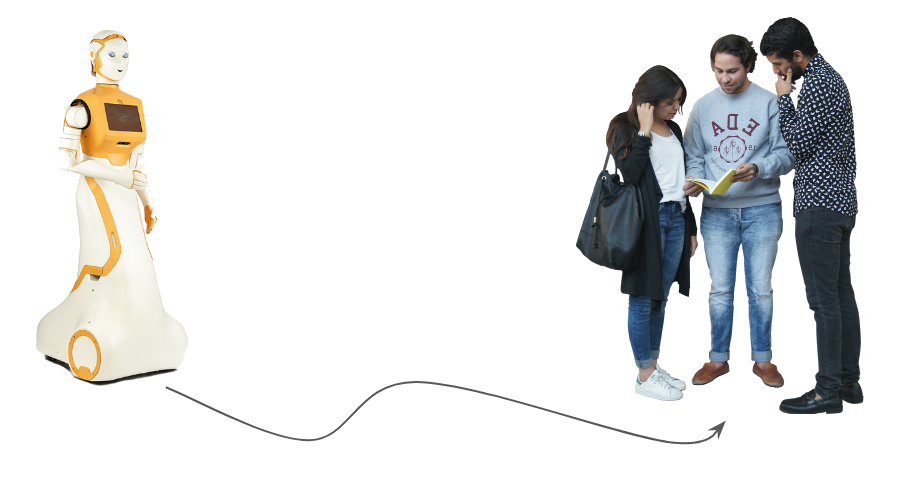Project
The internship is part of our research project into Deep Reinforcement Learning (DRL) [1,2] for the European SPRING project [3]. SPRING aims to develop control mechanisms for humanoid robots [4] that will be employed in health care environments. The robots should communicate with patients, their families, and caretakers to inform, aid, and entertain them. We are developing DRL methods to learn the robot’s movement behaviors, such as human-aware navigation, how to best approach people, or how to collect sensor information (visual and auditory) to allow successful conversations between the robots and humans.
 A problem with DRL is its need for many data samples to learn appropriate behaviors. This is especially problematic in robotics as it is time-consuming to collect data. We focus therefore on Meta Learning [5] and Transfer Learning [6] to allow a fast adaptation of the learning and behaviors from already learned tasks to new ones. We are searching for new and innovative mechanisms to improve reinforcement learning in this context, as shown in our recent research project [7,8].
A problem with DRL is its need for many data samples to learn appropriate behaviors. This is especially problematic in robotics as it is time-consuming to collect data. We focus therefore on Meta Learning [5] and Transfer Learning [6] to allow a fast adaptation of the learning and behaviors from already learned tasks to new ones. We are searching for new and innovative mechanisms to improve reinforcement learning in this context, as shown in our recent research project [7,8].
Task
During your internship you will be reviewing relevant DRL approaches in the context of our recent Transfer and Meta RL research [7,8] under the guidance of your supervisor. Together you will develop ideas for improvements to the learning algorithm or the adaptation of the algorithm to new task scenarios. Your task will then be to implement the research idea and evaluate it on a robotics task (either simulated or real). You will have to compare it to existing approaches and report the experimental results in a comprehensive manner in form of a small research paper.
Team
You will join RobotLearn, an international team of researchers and students at Inria Grenoble. Besides its research into robotics, the team has a strong background in probabilistic models for the analysis and generation of sequential data such as video and audio recordings. You will be supervised by Chris Reinke (Postdoc) and Xavier Alameda-Pineda (head of the team) during your internship.
Requirements
Our main requirements are 1) motivation, 2) general knowledge about Machine Learning and Artificial Intelligence, and 3) knowledge in Python programming. Knowledge in Reinforcement Learning, Meta Learning, Transfer Learning, or robotics is not mandatory but a plus. You should be enrolled in a Master program.
Conditions
The internship should start at the beginning of 2023. It has a duration of 5 to 6 months. There will be a compensation of 500 – 600 Euro per month. Additionally, you will receive subsidized lunch meals (one lunch costs 2 – 4 Euro). You will have a dedicated working space at Inria with a workstation that has a GPU. Moreover, you will have access to one CPU and two GPU clusters to run experiments.
Application
Please send an e-mail to chris.reinke@inria.fr including a paragraph about your motivation, your CV, and a recent transcript of your grades.
References
[1] Li, Y. (2017). Deep reinforcement learning: An overview. arXiv preprint arXiv:1701.07274.
[2] Goodfellow, I., Bengio, Y., & Courville, A. (2016). Deep learning. MIT press.
[3] SPRING (Socially Pertinent Robots in Gerontological Healthcare). https://spring-h2020.eu/
[4] https://pal-robotics.com/robots/ari/
[5] Hospedales, T., Antoniou, A., Micaelli, P., & Storkey, A. (2020). Meta-learning in neural networks: A survey. arXiv preprint arXiv:2004.05439.
[6] Taylor, M. E., & Stone, P. (2009). Transfer learning for reinforcement learning domains: A survey. Journal of Machine Learning Research, 10(7).
[7] Reinke, C., & Alameda-Pineda, X. (2021). Xi-Learning: Successor Feature Transfer Learning for General Reward Functions. arXiv preprint arXiv:2110.15701.
[8] Ballou, A., Alameda-Pineda, X. & Reinke, C. (2022). Variational Meta Reinforcement Learning for Social Robotics. arXiv preprint arXiv:2206.03211.




